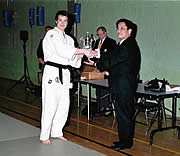Dr Buley, Distinguished Guests, Ladies and Gentlemen,
I am delighted to be with you this evening on the occasion of the 75th anniversary of the Oxford and Cambridge University Judo Match. I am also encouraged to see so many guests from the Tokyo Students Judo Federation, having come all the way from Japan.
This is the first time I have been back to this lovely city of Oxford for ten years. Your kind invitation has enabled me not only to enjoy an exciting Judo contest but to make new friends and enjoy these elegant surroundings of Christ Church for a few agreeable hours.
We meet this evening at a time when Japan-UK relations are in fine shape and free of any contentious issues. Our two countries enjoy thriving economic links and cordial ties. Moreover, our partnership is deepening on the global stage through close policy consultation and co ordination on a wide range of issues, including Iraq.
Meanwhile, cultural interaction and grassroots exchange are proceeding apace. We are finding inspiration in each other's art, literature, cuisine, pop culture, technology and sports. Soccer, rugby and golf are well established in Japan, while Judo and the martial arts are practised all over the UK. In fact, I was surprised to find how many British people are practising Judo, and how widely dispersed throughout the country the population of Judo practitioners is.
My first encounter with Judo dates back to my boyhood. When I was six years old, my father took me to a Dojo, or Judo training hall, on a cold winter's day for my first ever Judo session. This grew into a regular occurrence, which I hated because it always coincided with kids' TV time, when popular cartoons and adventures were broadcast. I gave up Judo about a year later. The second time I became involved with Judo was when I was in high school. Judo was part of the required school curriculum , and this time I enjoyed it as a sport to a reasonable extent . However, it was not until I reached middle age that my interest in Judo somehow deepened - this time not as a practitioner but as a spectator.
I like the skill and dexterity with which the Judo practitioner counters his or her opponent's power and speed. I also admire the respect and courtesy which each person affords the other in the mat area. Of course, Judo is not just about combat techniques. What is perhaps more important is the underlying principle. This, according to the late Professor Jigoro Kano, father of Modern Judo, is "to make the most efficient use of mental and physical energy". This concept, with its emphasis on harmony, takes us into the realm of spirituality and has applications to human life that extend far beyond the Dojo. Thus, when taking up Judo, people from all over the world can experience something of the essence of Japanese culture. Judo is a spiritual as well as a physical sport and is very much cultural in character.
I understand that the practice of Judo in some form at Oxford goes back almost a century, and that the annual competition we have enjoyed today has been taking place for 75 years. May I pay tribute to Oxford and Cambridge University Judo for the valuable contribution it has made over so many years to greater mutual understanding and people-to-people exchange through its dedication to promoting Judo . I am sure that, in your loving and capable hands, the Oxford and Cambridge Match will continue for many more years. I hope that we will be gathering together again in 25 years to celebrate its centenary!
Thank you.

Minister Kishino presenting the Matsudaira Cup to Gary Chandler
(Captain of the winning Cambridge team) |
|


